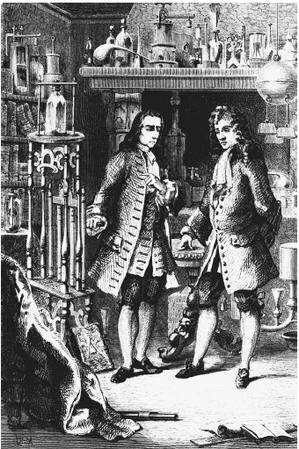Robert Boyle
BRITISH PHYSICIST AND CHEMIST
1627–1691
Robert Boyle was born in 1627, the youngest son of a large upper-class English family with significant landholdings in Ireland and ties to both sides of the English Civil War (1642–1651). Boyle's literary and religious interests

turned to natural philosophy as early as 1647. Boyle was active within the Baconian group called "the Invisible College," which would later become the Royal Society , chartered by King Charles II after the Restoration.
Among Boyle's earliest scientific work were studies involving the air pump. At the time, Robert Hooke was Boyle's laboratory assistant. Starting with the German physicist Otto von Guericke's description of an air pump, Hooke improved on its design, reducing its size and increasing its performance while making it easier to use. Utilizing this improved air pump, Boyle devised experiments to explore the properties of air. He examined the behavior of sound, heat, light, electricity, magnetism, chemical reactions (such as a flame), and living systems (such as small animals or plants) in a vacuum. He also considered the behavior of the air itself under extension or compression. The result of this study was the relationship now known as Boyle's law, which states that the pressure and volume of a confined air (gas) are inversely related. Mathematically, this is expressed as pressure times volume equals a constant
PV = constant
In 1661 Boyle published the first edition of The Sceptical Chymist. A second, expanded edition was published in 1680. It has earned him the title "the father of chemistry" among some British historians. Many point to this as the work in which Boyle examined numerous alchemical procedures and ultimately rejected the classically derived notion of the four elements (earth, air, fire, and water); also dismissed the Paracelsian notion of three essences: salt, sulfur, and mercury; and articulated a relatively modern working definition of atoms. Modern scholarship has questioned some of the details of this interpretation of Boyle's work, but his importance cannot be denied.
Boyle was among the first chemists not primarily trained in medicine and medicinal chemistry, in mining and metallurgy , or interested in those applications. He was also among the first to recognize chemistry as an intrinsically important subject for natural philosophy. In pursuing such a line of thought, he had to convince natural philosophers that chemistry was something other than the disreputable alchemy it was known as and chemists that the experimental principles of natural philosophy might offer them a valuable area of practice.
Boyle refocused the study of chemistry in two important ways. First, he shifted attention away from questions surrounding the source and history of a material to its identity and purity. Second, he redirected the interest in desired byproducts to an examination of the chemical reaction itself. In doing this, Boyle promoted the use of chemical identity tests and a control arm in an experiment. Among the measures of identity and purity were color, specific gravity, crystal shape, flame tests, solubility, precipitates, and reaction to standardized reagents . In these ways, Boyle helped frame the important questions for succeeding chemists until the seminal work of Antoine-Laurent Lavoisier.
SEE ALSO Alchemy .
David A. Bassett
Bibliography
Boas, Marie (1958). Robert Boyle and Seventeenth-Century Chemistry. Cambridge, UK: Cambridge University Press.
Boyle, Robert (1772). The Works of the Honorable Robert Boyle. 6 vols. Reprinted, Bristol, U.K.: Thoemmes Press, 1999.
Comment about this article, ask questions, or add new information about this topic: